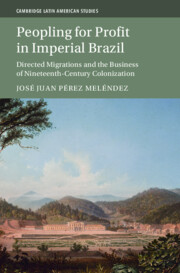 Peopling for Profit in Imperial Brazil
Peopling for Profit in Imperial Brazil Book contents
- Peopling for Profit in Imperial Brazil
- Cambridge Latin American Studies
- Peopling for Profit in Imperial Brazil
- Copyright page
- Dedication
- Contents
- Figures
- Tables
- Acknowledgments
- Note on Currency and Language
- Abbreviations
- Maps
- Introduction
- Part I Colonization’s Statecraft
- Part II Colonization Companies and the Colono Trade
- 3 Shareholder Oligarchies
- 4 Palatial Diplomacy
- 5 Brazil’s Great Transformation
- Part III Disentangling Companies and State
- Part IV Peopling the Country of the Future
- Conclusion
- Bibliography
- Index
- Series page
4 - Palatial Diplomacy
Colonization at the Hand of the Emperor’s Cabal
from Part II - Colonization Companies and the Colono Trade
Published online by Cambridge University Press: 26 September 2024
- Peopling for Profit in Imperial Brazil
- Cambridge Latin American Studies
- Peopling for Profit in Imperial Brazil
- Copyright page
- Dedication
- Contents
- Figures
- Tables
- Acknowledgments
- Note on Currency and Language
- Abbreviations
- Maps
- Introduction
- Part I Colonization’s Statecraft
- Part II Colonization Companies and the Colono Trade
- 3 Shareholder Oligarchies
- 4 Palatial Diplomacy
- 5 Brazil’s Great Transformation
- Part III Disentangling Companies and State
- Part IV Peopling the Country of the Future
- Conclusion
- Bibliography
- Index
- Series page
Summary
The lessons learned from private colonization experiments in the 1830s drove Brazilian lawmakers back to the drawing board to devise policies that could both promote private colonization schemes and keep them under the government’s purview. A reinstated executive seized the reins of colonization as the royal household enthusiastically founded model colonies spearheaded by the young emperor and his sister. A small group of palatial figures, or áulicos, close to the emperor made this possible from key appointments including in the reactivated Council of State, which oversaw ad hoc colonization petitions. In parliament, the slow but steady evolution of land law bills further contributed to the Brazilian government’s resolve to exercise regulatory muscle. This process came to a head with the debacle of the Delrue contract – a colono-provisioning deal with a French firm that went sour when the Brazilian government discovered numerous irregularities in the payments claimed by Delrue. Ironically, the Delrue scandal empowered Vergueiro & Co., a São Paulo-based firm that would become a leading colono distributor within a decade, demonstrating that the colonization irradiated from Rio de Janeiro to São Paulo, and not the other way around.
Keywords
- Type
- Chapter
- Information
- Peopling for Profit in Imperial BrazilDirected Migrations and the Business of Nineteenth-Century Colonization, pp. 120 - 151Publisher: Cambridge University PressPrint publication year: 2024
